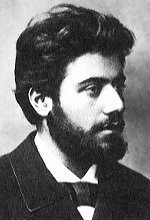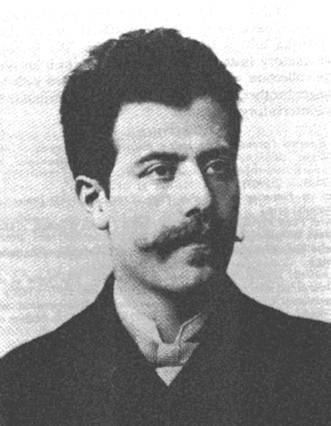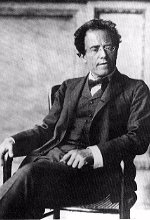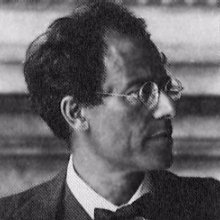MAHLER AND HIS „INFERNAL THEATER LIFE"
1880 - Professional orientation

21 Years old
It may be taken for granted that Mahler wanted to put an end to the
starvation existence, that he scraped as piano teacher during his student
days, and that he made for that reason the decision to use his musical
gifts and acquired knowledge to earn his living - even at the price to
have to follow a theater career.
The fact is that he concluded a „general acknowledgment" for five
years with the Viennese theatrical agent Gustav Lewy on May 12th 1880.
According to this contract, Lewy covenanted to look after Mahler's „whole
theatrical matters" against five percent of his respective fee. With
this contract, Mahler put himself at the theater's mercy - The „infernal
theater life", as he apostrophized it later.
1880 - conductor in Bad Hall and Laibach
The first job, that Lewy found for him, was a post as a conductor
at the summer theater in Bad Hall (Upper Austria) with a monthly salary
of thirty guldens and a „playing fee" of fifty kreuzers. Mahler worker
here only sic weeks (approximately from May 20th to July 1st 1880). His
scope of duties was to conduct operettas and to accompany farces with music.
In autumn 1881, he went to Laibach, today Ljubljana (Sovenia),
at that time capital of the duchy Krain, as conductor at the „Landschaftliche
Theater" (regional theater). Here, an orchestra of 18 musicians and
a choir of 14 singers were at his disposal, the soloists were mostly engaged
from guest opera companies at the theater. His work covered in about equal
shares opera, operetta, Singspiel and stage music. Despite the provincial
limitation of means, he could look back at the end of the season 1881/82
- contrary to the unproductive weeks in Bad Hall - on several artistic
successes.
In March 1882, he performed as pianist at the „Philharmonische
Gesellschaft" (philharmonic society). The local press celebrated the
conductor as „well trained musician, who takes his difficult task seriously".
1883 - Olmütz, Vienna and Kassel
Mahler wanted to spent the autumn and winter 1882/83 as usual in
Vienna working on his „Rübezahl" and keeping company with the
friend of his youth.
But the possibility of a new engagement ensued and he became conductor
at the royal-municipal theater of the Moravian town Olmütz (today
Olomouc, Czech Republic) in mid-January 1883. He stayed there only
till mid-March 1883, because the season was stopped prematurely
for lack of money.
During the same month, the found work as choir conductor at the
Carltheater in Vienna, where an Italian opera stagione gave guest performances
till early inMay.
In summer 1883, he went for the first time to Bayreuth:
„However low my mood may be, when I think of Wagner, I became good-humored.
That a light like his could ever fill the world!"
On October 1st 1883, he took an engagement for three years
as second conductor at the court theater in Kassel. From the start, his
job was unsatisfactory, because as „second man" he was not entrusted with
the „classicical works", but he had above all to supervise the operas by
Lortzing,
Weber, Donizetti, Meyerbeer and Marschner.
As theater composer, he wrote in Kassel the music for a representation
of Scheffel's „Trompeter von Säckingen" in seven tableaux vivants.
The partition, which was soon used with success by other German theaters,
is not preserved. During his time in Kassel, he composed the cycle „Lieder
eines fahrenden Gesellen" and the beginnings of his First Symphony. There
is a close atmospheric and thematic correlation between the two works

Gustav Mahler (1884)
1885-1886 - Prague
A short season at the German theater in Prague (1885/86) followed, where
he rehearsed „Meistersinger", „Tannhäuser", „Rheingold" and „Walküre".
This year in Prague was probably the strongest asset in Mahler's artistic
development. Just twenty-five years old, he was permitted to conduct for
the first time the great operas, which performances became later the musical
events of his time as director in Vienna: Beside Wagner's operas, Beethoven's
„Fidelio", Mozart's „Don
Giovanni" and Gluck's „Iphigenie in Aulis".
His probably most important success in Prague was a concert on
February
21st 1886, where he conducted from memory Beethoven's „Ninth Symphony",
Mozart's G minor Symphony and the scherzo from Bruckner's
„Third Symphony".
In Prague, three od his piano lieder were also performed for the
first time: „Frühlingsmorgen", „Hans und Grete" and „Ging heut' morgen
übers Feld".
1886 - Leipzig
In August 1886, he made his debut as second conductor at
the municipal theater in Leipzig. Here, he had to hold his own beside the
first conductor Arthur Nikisch. From January 1887 on, he acted for
the sickened Nikisch and took over the whole repertoire: In the season
1887/88,
he conducted 54 different works in no less than 214 performances.
In addition he took even time to draft his first symphony and
to arrange Carl Maria Weber's opera torso „Die drei Pintos" - for Mahler
had met in Leipzig the family of Carl Maria von Weber's grandson. He completed
Weber's sketches of the comic opera and performed the stage work for the
first time on January 20th 1888 at the municipal theater of Leipzig.
The success was great, Mahler was celebrated with thundering applause,
cheers and laurel wreathes, „his" opera was performed within a year in
Dresden, Prague, Bremen, Breslau (Wroclaw), Frankfurt, Hamburg, Kassel
and finally even at the court opera of Vienna. So, Mahler became well-known
and famous in the musical world at first neither as conductor nor as symphonist,
but as „composer" of a comic opera by Carl Maria von Weber.
1888-1891 - Budapest
From autumn 1888 (after Felix Mottl's retirement) to his
premature resignation in spring 1891, caused by a change of the
director, Mahler was director of the Royal-Hungarian Opera in Budapest.
Here, he devoted himself to the setting-up of a national, indipendent opera
culture, he tried to establish an indigenous Hungarian ensemble and put
the opera
„Brankovics György" by the national composer Ferenc
Erkel on the stage.
In January 1889, he staged the unabridged first performance
of Wagner's „Rheingold" and „Walküre" in Hungarian language.
He needed more than 80 rehearsals for the production. Another milestone
on his way to international fame as conductor was the new production of
Mozart's„Don
Giovanni" in 1890 - a performance praised as being authentic
by Johannes Brahms.
But the première of his First Symphony on November 20th
1889 was a failure. A reviewer described the work as being „just
as confused and vague as Mahler's work as opera director".
From that time on, Mahler had more and more to struggle against
difficulties as opera director in Budapest. Finally he rescinded his ten-year
contract by reason of artistic disagreements with the new director Count
Zichy and resigned his post after receipt of a high sum of indemnity in
March
1891.
1891-1897 - Hamburg
On September 1st 1891, theater director Bernhard Pollini (1838-1897)
appointed him first conductor of the municipal theater in Hamburg, where
he stayed till 1897.
Mahler had a relatively free hand in the choice and arrangement
of the program and the ensemble. The red thread in his programming were
and continue to be Mozart,
Beethoven
and Wagner. In Hamburg, he conducted for the first time the complete „Ring
des Nibelungen".
In addition, he worked on his Second Symphony and conducted also
single concerts, such as the performances of Bruckner's „Te Deum", on which
he reported to the composer: „I have performed one of your works... Both
the players and the whole public were deeply moved. Now, Bruckner
has made his triumphant entry in Hamburg."
Also the guest performance of the opera of Hamburg in London in
1892
contributed much to Mahler's international reputation as conductor.

Mahler as conductor of the „philharmonic concerts"

In September 1898, a delegation of the Vienna Philharmonic Orchestra
approached Mahler with the request to succeed Hans Richter in conducting
the philharmonic subscription concerts. On November 1898, Mahler
conducted his first „philharmonic concert".
But Mahler's tie with the philharmonic orchestra was of short
duration: Mahler was a courageous innovator and always keen of experimenting.
When he played Beethoven's string quartet in F minor with the complete
philharmonic string orchestration and set about making alterations to the
instrumentation of Beethoven's
symphonies, he provoked the opposition of the public and the critics. The
performance of the Ninth Symphony in February 1900 developed into
an affair, as Mahler ordered the reinforcement of the wind section, the
stiffening of the expression marks and other tone retouches. On the occasion
of the repetition of the concert, he made distribute leaflets, in which
he justified his proceeding with Beethoven's deafness on the one hand and
with the enormous „intensification of his conceptions to find new forms
of expression" on the other hand.
In June 1900, he made a concert tour with the philharmonic
orchestra to the world's fair in Paris with five concerts, but only the
last two of them were successful.
Despite important performances of great works of the symphonic
literature, the inner resistance of the philharmonic orchestra to Mahler's
„tyrannical" rigidity grew and disagreements became more frequent. In April
1901, Mahler renounced finally conducting the philharmonic concerts.
Court conductor Joseph Hellmesberger succeeded him.
|